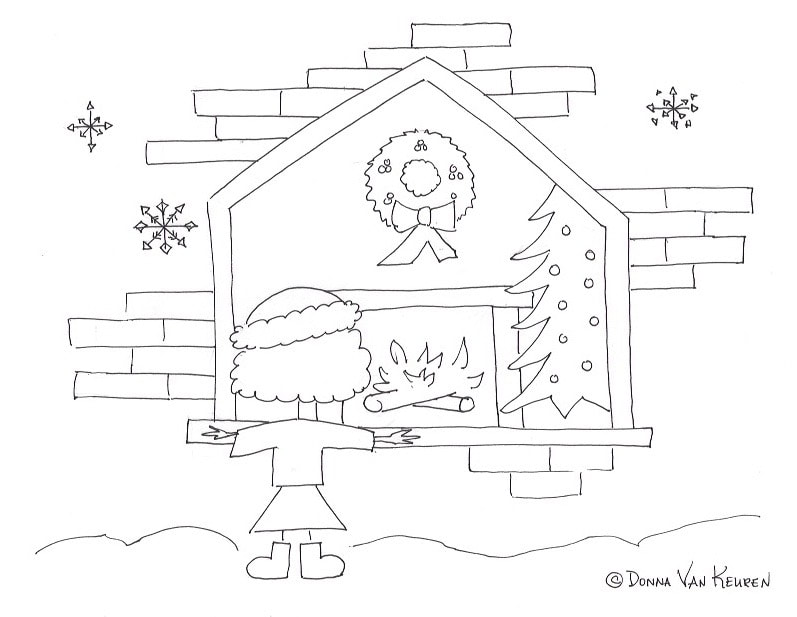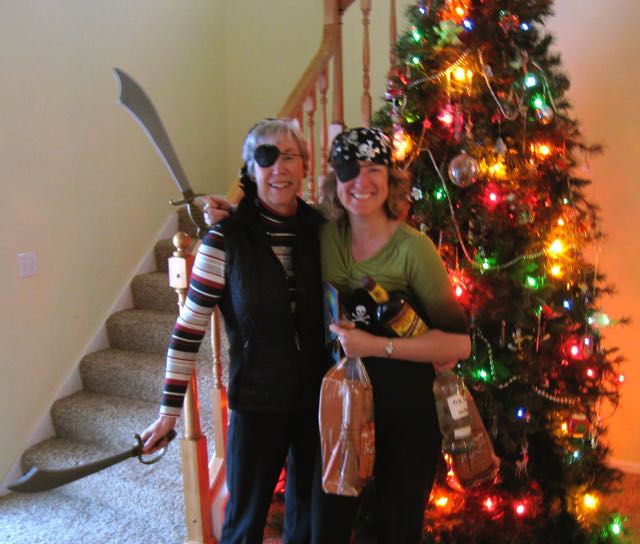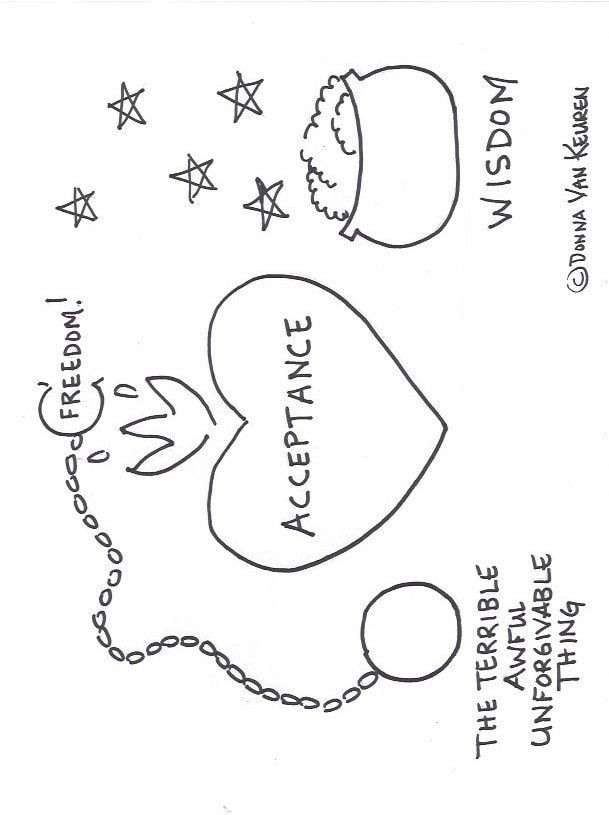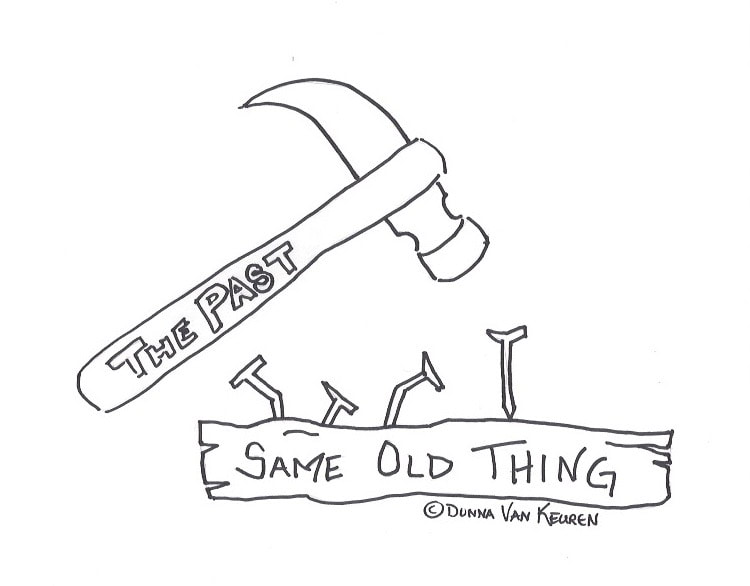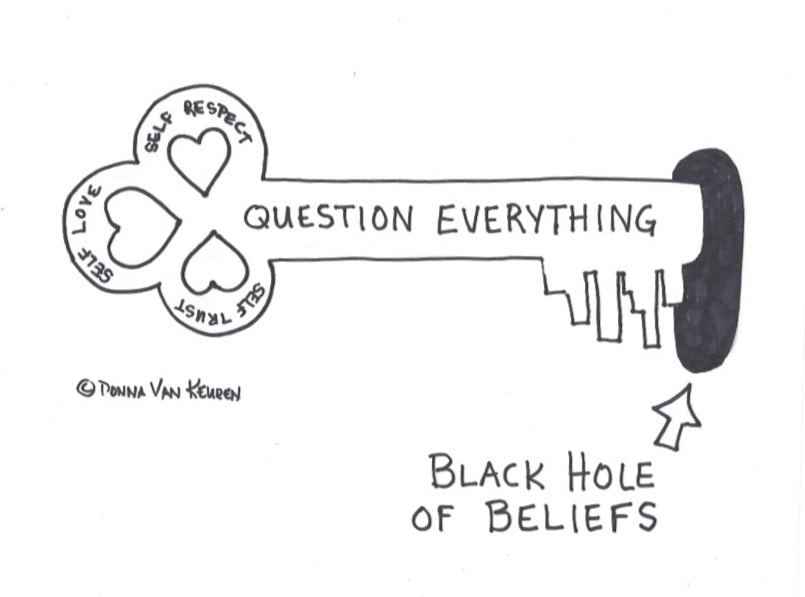The Season of Reckoning
Story
When I was young, Christmas Eve was my favorite day of the year. The magic was everywhere. It was in the snow, and in the stories, and in the way family gathered and laughed together. There was magic in the gift making and the giving. It was a day that represented the birth of the Light, and that Light was something I was drawn to with a passion.
However, as the years passed, the requirements of the holiday season began to take their toll on me. Being busy during the most internal time of the year went against my biorhythms, the bigness blew my budget, and the elves, well, they hadn’t been coming around for a while, so Mrs. Claus was tired. I was caught in an illusion...an endless repetition of the past. “Didn’t I use the exact same decorations and eat the same jello salad last year?” It all felt rather old and pointless, which was heartbreaking to me because this was supposed to be the season of miracles! I felt I was standing outside in the cold looking in on the magic.
Then in December 2008, my Dad passed away after a 10-year journey with dementia. His memorial service took place a few days before Christmas. My heart felt bruised and the weight of the holiday seemed unbearable. Mom came to stay with us and we shed a few tears and made it through; but on Christmas day she drove back home to find her kitchen window shattered, her pipes frozen, her home ransacked and her precious possessions stolen, including my Dad's box of treasures and the jewelry he gave her as gifts over the years. The robbers evidently saw the obituary in the paper and figured her house would be a good target...on Christmas Eve, the most "magical night of the year."
Something died in me that day. After I listened to my mom wailing like a wounded animal on the phone, I locked myself in the bathroom and screamed out my rage, which frightened my husband and son. I finally managed to pull myself back together to help with the police reports and the repairs, but I never did spring back to my jolly old self.
Friends and family became deeply concerned. “This robbery didn’t happen to you,” they said. But they were wrong. I was robbed, of my naiveté, of my trust in humanity, and of my religious belief that, if you are good and do good things, then bad things won’t happen to you or the people you love, ESPECIALLY on Christmas Eve. “Where was God in this?” I wondered. My faith in the system I believed in died that Christmas.
My feelings of rage and betrayal brought up everything I’d secretly fumed about for years, but had stuffed down because it didn't match my practically perfect image. I wanted to lash out at the world. I wanted to hurt the people that had hurt my mother, and I was horrified to discover this deeply wounded perpetrator lurking within me. How was I any different from the angry people that had performed this violation? I evidently wasn’t.
My husband, bless him, bought my Mom and I pirate outfits, rum, and loaves of bread to shred with our bare hands (which is some of the greatest therapy there is for $1.99). I went through many loaves of cheap bread that winter (we won’t talk about the rum). Twas the season of my reckoning.
What Happened Next
The following summer, as fate would have it, I found myself at a local prison interviewing inmates as part of a peace project. One of the prisoners shadowed me the whole day and eventually came up to me. My heart started pounding when our eyes met because I could feel the magnetics between us. He told me he would be completing his sentence in a few days…for robbery.
Boom. There it was…the magnetics revealed. He was watching me like a hawk. I must have had a sign above my head that said, “Robbery victim here. If you want grace, she is the one to give it to you.” He shared how he wanted a fresh start. I listened and gave him my blessing.
When the holiday season came around again six months later, I woke up early on Christmas Eve, and in the quiet moments before dawn, I felt gratitude rise in me. There were many things for which I felt thankful including, surprisingly enough, the robbery. I realized how much my mother had expanded in the past year, freed of possessions that might have become an altar to the past. I had expanded too. A new kind of compassion was emerging out of the ashes of my “good girl” persona and religious beliefs. My inner fields had been tilled, and new seeds planted when I wasn't looking.
All of a sudden, I felt energy surge up my body and out the top of my head in a surprising rush. It felt like a wave of grace. From that day forward, whenever the robbery came to mind, I never again felt the old emotional charge, only acceptance of what was and a burgeoning sense of freedom.
Insights
When the robbery happened, I did not want to believe that it came in service to me. Such a thought was very hard to swallow, and I needed to feel my feelings and allow forgiveness to emerge organically before I could see the event from a higher perspective.
The truth was, my belief systems needed an update, and since I was not letting go of them willingly, I had to be shaken out of my comfort zone. It was not my job to save my mother from her suffering nor to take it on as my own. Doing so stopped me from facing my own suffering patterns. Maybe I was also experiencing the back side of a karmic cycle. Given the charge I felt around this event, I confess this is entirely possible. In any case, other people played certain roles so both my and my mother's trapped energy could move. From the divine point of view, such experiences are always created from love, but in the moment it didn't feel so loving. When I could finally accept what happened, whether I felt the act itself was acceptable or not, the energies began to neutralize. Acceptance was what made forgiveness possible.
When the robbery happened, I did not want to believe that it came in service to me. Such a thought was very hard to swallow, and I needed to feel my feelings and allow forgiveness to emerge organically before I could see the event from a higher perspective.
The truth was, my belief systems needed an update, and since I was not letting go of them willingly, I had to be shaken out of my comfort zone. It was not my job to save my mother from her suffering nor to take it on as my own. Doing so stopped me from facing my own suffering patterns. Maybe I was also experiencing the back side of a karmic cycle. Given the charge I felt around this event, I confess this is entirely possible. In any case, other people played certain roles so both my and my mother's trapped energy could move. From the divine point of view, such experiences are always created from love, but in the moment it didn't feel so loving. When I could finally accept what happened, whether I felt the act itself was acceptable or not, the energies began to neutralize. Acceptance was what made forgiveness possible.
I've come to see that actions created from a wounded heart usually create more wounding, and that creating a safe space for our hearts to heal from old trauma is one of the most loving acts that we can perform for ourselves and others because it stops the karmic cycle. I learned I could create that safe space by being very aware of what life was bringing me, acknowledging my true feelings about what I was experiencing, and taking responsibility for the experience I created for myself. Only then was peace possible.
The more I did this, the more I started to see cycles in my human behavior. If I was identified with my pain, then it was quite likely I would play one of three roles:
I have played each one of these roles. In those moments, it seemed there was only so much energy to go around, and I had to get energy from something or someone outside of myself. I believed I had to play the role I played, and I was attached to a specific story that validated my behavior. Each time I played one of these roles, I needed other actors to play the other parts. If the other parts were not played, the game could not continue. If I paid close attention, I could see that I often cycled through the various roles one after the other. The victim could easily become a perpetrator. The rescuer could easily become the victim, etc. I call this drama the Energy Feeding Game.
To better understand how the game is played, let me offer an example that I call the Key Lime Pie Incident. I share this story with permission.
I know someone who once arranged an 80th birthday celebration for his dad which I attended. While planning the event, my friend was told by his sister that she was going to bring key lime pie to the party because it was their dad's favorite. When my friend shared the menu for the party with his dad, he was all excited about the pie.
The day arrived, and the daughter did not bring key lime pie to the party.
My friend's dad started pouting and said to his daughter, "Oh, I thought you were making key lime pie for me!" He looked like a crushed five year old.
The daughter responded, “I never said I was making key lime pie. Whoever gave you that idea?” She then turned and glared at my friend. He later told me that he felt set up, just like when he was a child. His sister would often tell him one thing and then later make him look like a liar in front of his parents. He had felt the sharp end of this stick more than once, and I could see quite clearly that he had had enough of this game. By now, the guests were looking at him and his sister. The tension was palpable.
In such instances, it is so easy to fall back into old roles. It is as if there is a cardboard cutout with our face on it that others put up in front of us. It represents the person they expect to see and the behavior they anticipate. My friend traditionally played the role of justice keeper/rescuer in the family, because fairness and truth are very important to him. In this case, his cardboard cutout instinct was to defend the wounded party, whom he believed to be his father. Since it seemed his sister set him up to look like the fool, he instinctively wanted to put the cardboard cutout of the perpetrator in front of her. Roles assigned, stage set...what would happen next?
The Energy Feeding Game demands that personal buttons be pushed to get the energy flowing, and family knows just how to push those buttons better than anyone because they installed them. It is interesting to me that the word "familiar" originated from the concept "on a family footing.” This reveals our genetic and ancestral tendency to build on the same foundation and repeat the same patterns over and over so we stay connected to our tribe. When certain patterns have been developed through generations, they are locked into our genes and we carry the patterns forward unconsciously. Everyone expects the patterns to continue. But what happens if the patterns are broken?
The more I did this, the more I started to see cycles in my human behavior. If I was identified with my pain, then it was quite likely I would play one of three roles:
- The Perpetrator - Uses power to get energy through physical, emotional, or mental attacks. This behavior creates a sense of control that hides a feeling of powerlessness.
- The Victim - Uses helplessness to get energy through suffering. This behavior creates a sense of martyrdom that compensates for shame.
- The Rescuer - Uses righteousness and pity to get energy through acts of salvation. This behavior creates a sense of worthiness that masks guilt.
I have played each one of these roles. In those moments, it seemed there was only so much energy to go around, and I had to get energy from something or someone outside of myself. I believed I had to play the role I played, and I was attached to a specific story that validated my behavior. Each time I played one of these roles, I needed other actors to play the other parts. If the other parts were not played, the game could not continue. If I paid close attention, I could see that I often cycled through the various roles one after the other. The victim could easily become a perpetrator. The rescuer could easily become the victim, etc. I call this drama the Energy Feeding Game.
To better understand how the game is played, let me offer an example that I call the Key Lime Pie Incident. I share this story with permission.
I know someone who once arranged an 80th birthday celebration for his dad which I attended. While planning the event, my friend was told by his sister that she was going to bring key lime pie to the party because it was their dad's favorite. When my friend shared the menu for the party with his dad, he was all excited about the pie.
The day arrived, and the daughter did not bring key lime pie to the party.
My friend's dad started pouting and said to his daughter, "Oh, I thought you were making key lime pie for me!" He looked like a crushed five year old.
The daughter responded, “I never said I was making key lime pie. Whoever gave you that idea?” She then turned and glared at my friend. He later told me that he felt set up, just like when he was a child. His sister would often tell him one thing and then later make him look like a liar in front of his parents. He had felt the sharp end of this stick more than once, and I could see quite clearly that he had had enough of this game. By now, the guests were looking at him and his sister. The tension was palpable.
In such instances, it is so easy to fall back into old roles. It is as if there is a cardboard cutout with our face on it that others put up in front of us. It represents the person they expect to see and the behavior they anticipate. My friend traditionally played the role of justice keeper/rescuer in the family, because fairness and truth are very important to him. In this case, his cardboard cutout instinct was to defend the wounded party, whom he believed to be his father. Since it seemed his sister set him up to look like the fool, he instinctively wanted to put the cardboard cutout of the perpetrator in front of her. Roles assigned, stage set...what would happen next?
The Energy Feeding Game demands that personal buttons be pushed to get the energy flowing, and family knows just how to push those buttons better than anyone because they installed them. It is interesting to me that the word "familiar" originated from the concept "on a family footing.” This reveals our genetic and ancestral tendency to build on the same foundation and repeat the same patterns over and over so we stay connected to our tribe. When certain patterns have been developed through generations, they are locked into our genes and we carry the patterns forward unconsciously. Everyone expects the patterns to continue. But what happens if the patterns are broken?
So, the promised pie was not delivered. Dad was pouting, his daughter's face looked like a thunderstorm, and my friend, instead of reacting (though I could see he wanted to) pushed the pause button on the game. He simply sat, quiet and alert, digesting all the information. He glanced over at his dad, who was looking on expectantly, almost eagerly, at the drama that was about to unfold. Being a known shit disturber, one could see he would enjoy a little drama as an energy birthday present. Maybe he felt this was "just desserts" for not getting his pie. I could see this tidbit of information was also being digested calmly by my friend, who in the end, said nothing at all. He just dropped the game completely. As the silence grew, his sister actually looked at him with surprise and disappointment. His father looked confused. My friend was not behaving as expected.
The party went on, and I could see that other family members were viewing my friend with a bit of caution. He had become a wild card and was not to be trusted. For example, my friend later struck up a conversation with his brother's son who was in college, asking him questions about his experience there. His father answered for him, calling the answers out from the other room!
In the evening, my friend slipped out and bought a key lime pie for his dad, which he gave to him after the party was over. "Making things right," he said, because he had told his dad there would be pie...and now there was pie. He joked with me on the way home that he would probably not be welcomed at the next family event. There was a twinkle in his eye as he said it, and I understood he was perfectly okay with this. In fact, several years later when his dad passed away, my friend chose not to attend the funeral. Instead he honored his father in his own way. The game could go on without him, but he would not be playing his old role again.
The party went on, and I could see that other family members were viewing my friend with a bit of caution. He had become a wild card and was not to be trusted. For example, my friend later struck up a conversation with his brother's son who was in college, asking him questions about his experience there. His father answered for him, calling the answers out from the other room!
In the evening, my friend slipped out and bought a key lime pie for his dad, which he gave to him after the party was over. "Making things right," he said, because he had told his dad there would be pie...and now there was pie. He joked with me on the way home that he would probably not be welcomed at the next family event. There was a twinkle in his eye as he said it, and I understood he was perfectly okay with this. In fact, several years later when his dad passed away, my friend chose not to attend the funeral. Instead he honored his father in his own way. The game could go on without him, but he would not be playing his old role again.
Conclusion
To end the victim/perpetrator/rescuer cycle for both me and for my friend required several things. First we had to see the game and the role we traditionally played within it. Second we had to be willing to let our story go and make a new choice in the moment. It takes courage to see the story, because once we are willing to see the truth of something, we can't unsee it. It takes even more courage to make a new choice, because such choices have consequences. They put us outside the tribe, and may significantly impact certain relationships. Since we are attached to our old roles, and perhaps even addicted to the energy we gain from playing them, choosing something new means we must be willing to rest in the void until our energy rearranges to serve us differently.
Thoughts are electric and emotions are magnetic. Together they create a reinforcing loop of repetitive experience. When we think the same thoughts over and over, they become charged with emotions and become the glue that holds our world view in place. They act like spells cast upon our energy. Freedom is born when we question our beliefs and release our energy from its conditioning.
When we see the story and our role in it, it may still take several attempts to break the pattern. In my experience, I could at first only recognize what happened after it happened. Hindsight, it seems, is 20/20. The more my awareness grew, I would begin to see the potential chaos coming at me, but still not be able to stop my conditioned reaction to it. If I stayed with it, however, I eventually would begin to recognize a potential and read the energy signature from a distance, allowing me time to step out of the path and respond in a new way. This level of mastery required both a clear intent and a commitment to growing my conscious awareness, and it took practice...sometimes 10,000 hours of practice.
With patience, however, I began to dismantle the victim/perpetrator/rescuer story that was never mine to begin with. I did this by watching my mind and neutralizing the emotional charge attached to my thoughts. By pushing the pause button and questioning my beliefs, I was able to free myself from my addictive story.
To end the victim/perpetrator/rescuer cycle for both me and for my friend required several things. First we had to see the game and the role we traditionally played within it. Second we had to be willing to let our story go and make a new choice in the moment. It takes courage to see the story, because once we are willing to see the truth of something, we can't unsee it. It takes even more courage to make a new choice, because such choices have consequences. They put us outside the tribe, and may significantly impact certain relationships. Since we are attached to our old roles, and perhaps even addicted to the energy we gain from playing them, choosing something new means we must be willing to rest in the void until our energy rearranges to serve us differently.
Thoughts are electric and emotions are magnetic. Together they create a reinforcing loop of repetitive experience. When we think the same thoughts over and over, they become charged with emotions and become the glue that holds our world view in place. They act like spells cast upon our energy. Freedom is born when we question our beliefs and release our energy from its conditioning.
When we see the story and our role in it, it may still take several attempts to break the pattern. In my experience, I could at first only recognize what happened after it happened. Hindsight, it seems, is 20/20. The more my awareness grew, I would begin to see the potential chaos coming at me, but still not be able to stop my conditioned reaction to it. If I stayed with it, however, I eventually would begin to recognize a potential and read the energy signature from a distance, allowing me time to step out of the path and respond in a new way. This level of mastery required both a clear intent and a commitment to growing my conscious awareness, and it took practice...sometimes 10,000 hours of practice.
With patience, however, I began to dismantle the victim/perpetrator/rescuer story that was never mine to begin with. I did this by watching my mind and neutralizing the emotional charge attached to my thoughts. By pushing the pause button and questioning my beliefs, I was able to free myself from my addictive story.
Portal Perspective - Who we think we have to be and why we think we have to be it
are the source of all our suffering.
Key to Success - Only by letting go of what we know
can we discover a higher truth.
are the source of all our suffering.
Key to Success - Only by letting go of what we know
can we discover a higher truth.
